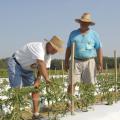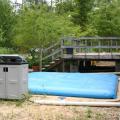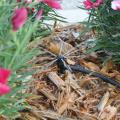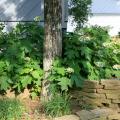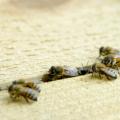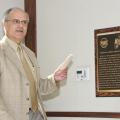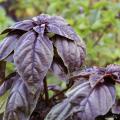News From 2011
HOUSTON – Two Chickasaw County farmers are discovering it takes a village to raise a crop.
Doil Moore and James Earnest have been business partners for more than two decades, but their latest adventure requires an extensive network of advisors to guide them through each challenge. In 2009, they started a small produce business on 3 acres in Houston. Thanks to advice from Mississippi State University specialists and other producers, they have expanded their acreage, crops and markets in 2011.
PICAYUNE – A local manufacturer of fuel and water storage tanks is testing a rainwater irrigation system at Mississippi State University’s Crosby Arboretum.
Senior Curator Patricia Drackett said the irrigation system offers environmental and financial benefits to this unique facility located in Picayune.
“We are interested in offering water conservation solutions to the local community,” she said. “The system has a solar controller and holds about 3,000 gallons of run-off from the roof of a portable building near the greenhouse.”
MISSISSIPPI STATE – Jonathan Pote has been named head of the Department of Agricultural and Biological Engineering at Mississippi State University.
Pote has served as interim head of the department since July 2010. He joined MSU in 1985 and has held a variety of administrative positions, including associate vice president for research and economic development and associate director of the Mississippi Agricultural and Forestry Experiment Station.
To combat the dry conditions creating problems for home gardens and landscapes, many Mississippi gardeners need to water their plants a lot more than usual.
Generally, applying 1 to 1 1/2 inches of water per week using overhead sprinklers will leave the root zones of your plants moist enough to encourage optimum growth. This method of watering works for annuals and groundcovers, as well as perennials, shrubs, trees and lawns.
MISSISSIPPI STATE – Summertime means outdoor meals with friends and family, and Mississippi State University food safety experts want everyone to use simple strategies to reduce the chances of foodborne illness.
Natasha Haynes, nutrition and food safety area agent with the MSU Extension Service in Lincoln County, recommends using these four steps: clean, separate, cook and chill. The steps are part of the Be Food Safe campaign developed by the U. S. Department of Agriculture’s Food Safety and Inspection Service.
PICAYUNE – Mississippi State University’s Crosby Arboretum in Picayune will host a workshop to help homeowners learn how to save money and the environment.
Stephanie Pendleton, MSU Extension Service director in Jackson County, will conduct a rain barrel workshop at the arboretum in Picayune on July 16 from 10 to 11 a.m. She will educate participants about the ways rain barrels can effectively capture water and help cut water costs. Participants will also make a rain barrel to take home for their own use.
MISSISSIPPI STATE – State officials are asking for the public’s help in stopping the spread of cogongrass, one of the world’s worst weeds, which has invaded 62 of Mississippi’s 82 counties.
The Mississippi Department of Agriculture and Commerce-Bureau of Plant Industry is asking anyone who spots this invasive grass to report the sighting by calling (662) 325-3390. The problem is severe enough that a Mississippi Forestry Commission assistance program is available in 19 counties to help landowners get rid of the weed.
Hydrangeas are old-fashioned, rounded-form shrubs that put on flamboyant flower displays in the summer and fall. And every year, great new selections are introduced, so gardeners should watch out for these terrific new options.
The three types of hydrangea commonly found in Mississippi gardens are the French, the PeeGee and the Oakleaf.
French hydrangea has two types of flowers: mopheads and lacecaps. Mopheads resemble pom-poms and are big, round and showy. Lacecaps are fern-like.
MISSISSIPPI STATE – Mississippi is part of a nationwide surge in beekeeping, as evidenced by increased attendance at several informative workshops held across the state this spring.
By Karen Templeton
MSU Ag Communications
MISSISSIPPI STATE – As floodwaters in the Delta recede, Mississippi State University experts are helping producers make wise decisions about cropland management.
By Karen Templeton
MSU Ag Communications
MISSISSIPPI STATE – Despite higher milk prices, the dairy industry struggles to make significant profits because of high production costs and lack of rain.
The current average price for milk is about $19 per hundredweight. In May 2010, the price was $15, up considerably from $11.60 in May 2009.
MISSISSIPPI STATE – Much of the flooded Delta was already planted for the 2011 season, and when it finally dries out, landowners will face challenges preparing it for planting.
Landowners of flooded acreage must manage a variety of issues, including oxygen-depleted soils, nutrient loss, soil compaction, debris removal and possible chemical contamination. Some acres may not be ready for planting again until next year.
MISSISSIPPI STATE -- Researchers and inventors often succeed with efforts others consider impossible, but one “crazy” idea in the 1930s and 1940s changed the face of agriculture and contributed to the formation of Mississippi’s first Fortune 500 company.
In April, the American Society of Agricultural and Biological Engineers unveiled a historic landmark plaque in Mississippi State University’s Agricultural and Biological Engineering Building. An identical plaque was unveiled May 27 at MSU’s Delta Research and Extension Center in Stoneville.
For fresh summer recipes, nothing beats the taste of basil. Gardeners who want to grow basil for cooking can choose from a variety of colors, textures and flavors, making this herb a garden showpiece.
Basil is one of the easiest herbs to grow during the hot summer months. Most gardeners start with common, or sweet, basil, which comes in a wide range of leaf sizes and textures. Lettuce leaf basil has leaves as big as a man’s hand, and they are textured like lettuce. Try replacing traditional lettuce with a single leaf of it on a sandwich.
By Karen Templeton
MSU Ag Communications
BILOXI – The oyster industry is bracing for extreme losses as freshwater from the Mississippi River flows into the western portion of the Mississippi Sound.
“Oysters are stationary and cannot escape as the freshwater displaces the salt water they need,” said Dave Burrage, professor of marine resources with the Mississippi State University Extension Service. “Oysters just cannot survive long periods of freshwater, so we are expecting significant mortality, maybe even 100 percent.”
MISSISSIPPI STATE -- Pets are notorious for chewing things, so caregivers need to be aware of some of the common toxins that do not come with warning signs.
Dr. Patty Lathan is an assistant professor of small animal internal medicine at Mississippi State University’s College of Veterinary Medicine. Unfortunately, she may be the first person to tell pet owners about the toxic properties of common household products, plants and even foods.
MISSISSIPPI STATE – State experts are sending out two surveys to seafood processors and restaurant owners to help analyze the needs and impact of Mississippi’s seafood industry.
Mississippi State University and Gulf States Marine Fisheries Commission are conducting the Economic Survey of Gulf Seafood Processors and Dealers. All the seafood processors and dealers in the state will be asked to complete surveys in an effort to learn more about key components of the Gulf seafood industry.
MISSISSIPPI STATE – Financial incentives for property owners to plant and manage their lands for timber production have been around since the 1930s, but many private landowners in Mississippi do not know about them.
These incentives, called cost-share programs, were developed to offset the initial costs for site preparation, tree planting and forest stand improvement.
MISSISSIPPI STATE – Mississippi State University recently merged two units to further strengthen efficiency and research efforts.
The Mississippi Variety Testing and Mississippi Foundation Seed Stocks, both research support units in the Mississippi Agricultural and Forestry Experiment Station, have been merged. The two units have worked together for more than a decade.
Brad Burgess, currently the variety testing unit’s director of research support, will oversee the newly created Mississippi Variety Testing and Foundation Seed.
MISSISSIPPI STATE – Practical strategies for sustainable living can help Mississippians save money, increase independence and benefit the environment.
Mississippi State University landscape architecture professor Pete Melby practices what he teaches his students: reduce energy consumption through thoughtful design, food gardening and rainwater collection.
“After the widespread power outages this spring, people have a new interest in ‘living off the grid’ or reducing their energy consumption,” Melby said.
Pages
News Types
- Crop Report (424)
- Feature Story (5885)
- Feature Photo (53)
- Extension Outdoors (318)
- Southern Gardening (1469)
- Extension Inbox (95)
Archive
- 2025 (60)
- 2024 (186)
- 2023 (182)
- 2022 (183)
- 2021 (176)
- 2020 (211)
- 2019 (222)
- 2018 (276)
- 2017 (336)
- 2016 (381)
- 2015 (456)
- 2014 (495)
- 2013 (487)
- 2012 (491)
- 2011 (354)
- 2010 (320)
- 2009 (313)
- 2008 (272)
- 2007 (263)
- 2006 (252)
- 2005 (278)
- 2004 (270)
- 2003 (279)
- 2002 (227)
- 2001 (238)
- 2000 (241)
- 1999 (231)
- 1998 (231)
- 1997 (239)
- 1996 (58)
- 1995 (36)

